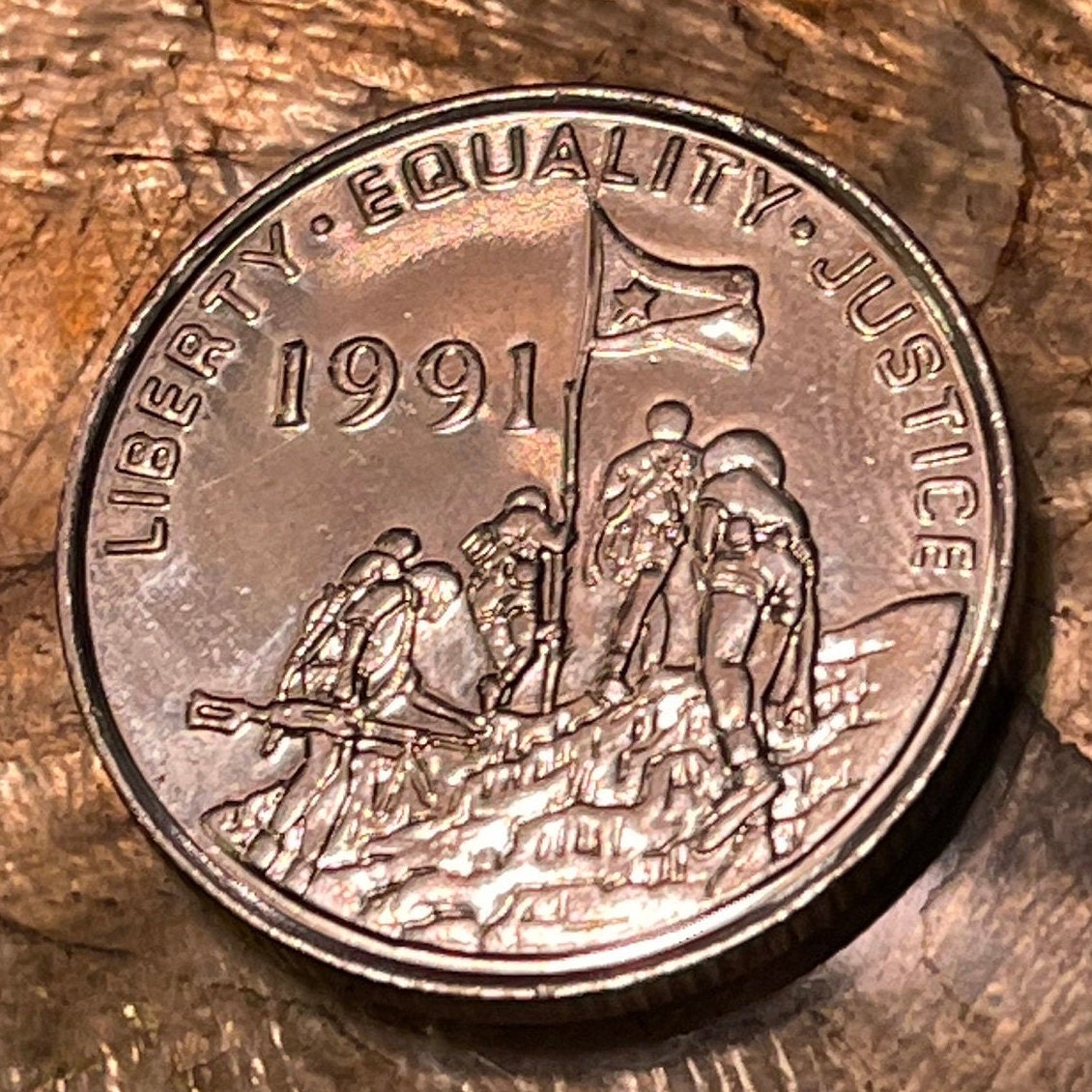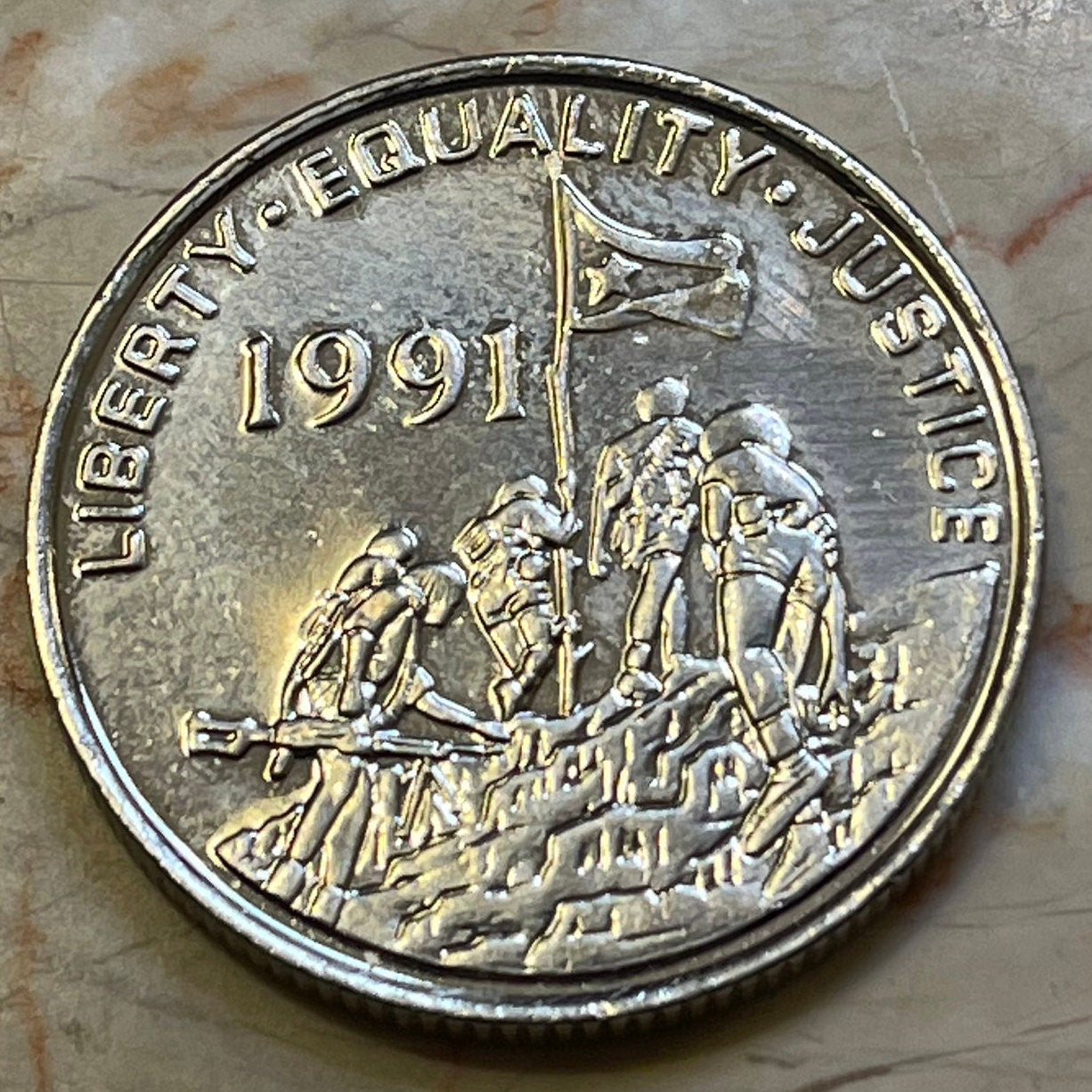elemintalshop
Elephant with Baby & Liberty Equality Justice 100 Cents Eritrea Authentic Coin Money for Jewelry and Craft Making
Elephant with Baby & Liberty Equality Justice 100 Cents Eritrea Authentic Coin Money for Jewelry and Craft Making
Couldn't load pickup availability
Elephant w/Baby & Liberty-Equality-Justice 100 Cents Eritrea Authentic Coin Charm for Jewelry and Craft Making
Obverse: Soldiers with flag motif
Lettering: LIBERTY·EQUALITY·JUSTICE
1991
Reverse: African elephants left
Lettering: STATE OF ERITREA
Features
Issuer Eritrea
Period Republic (1993-date)
Type Standard circulation coin
Year 1997
Value 100 Cents
1 ERN = 0.07 USD
Currency Nakfa (1997-date)
Composition Nickel clad steel
Weight 10.3 g
Diameter 27 mm
Thickness 2.7 mm
Shape Round
Orientation Coin alignment ↑↓
Number N# 2402
References KM# 48, Schön# 48
Wikipedia:
The African bush elephant (Loxodonta africana), also known as the African savanna elephant, is the largest living terrestrial animal, with bulls reaching a shoulder height of up to 3.96 m (13.0 ft) and a body mass of up to 10.4 t (11.5 short tons).
It is distributed across 37 African countries and inhabits forests, grasslands and woodlands, wetlands, and agricultural land. Since 2021, it has been listed as Endangered on the IUCN Red List. It is threatened foremost by habitat destruction, and in parts of its range also by poaching for meat and ivory. It is a social mammal, traveling in herds composed of cows and their offspring. Adult bulls usually live alone or in small bachelor groups. It is a herbivore, feeding on grasses, creepers, herbs, leaves, and bark.
Gestation lasts 22 months. Interval between births was estimated at 3.9 to 4.7 years in Hwange National Park. Where hunting pressure on adult elephants was high in the 1970s, cows gave birth once in 2.9 to 3.8 years. Cows in Amboseli National Park gave birth once in five years on average.
The birth of a calf was observed in Tsavo East National Park in October 1990. A group of 80 elephants including eight bulls had gathered in the morning in a 150 m (490 ft) radius around the birth site. A small group of calves and females stood near the pregnant female, rumbling and flapping their ears. One cow seemed to assist her. While in labour, fluid streamed from her temporal and ear canals. She kept standing while giving birth. The newborn calf struggled to its feet within 30 minutes and walked 20 minutes later. The mother expelled the placenta about 100 minutes after birth and covered it with soil immediately. Captive-born calves weigh between 100 and 120 kg (220 and 260 lb) at birth and gain about 0.5 kg (1.1 lb) weight per day. Cows lactate for about 4.8 years. Calves exclusively suckle their mother's milk during the first three months. Thereafter, they start feeding independently and slowly increase the time spent feeding until they are two years old. During the first three years, male calves spend more time suckling and grow faster than female calves. After this period, cows reject male calves more frequently from their nipples than female calves.
The maximum lifespan of the African bush elephant is between 70 and 75 years. Its generation length is 25 years.
********
Eritrea (/ˌɛrɪˈtreɪə, ˌɛrɪˈtriːə/ officially the State of Eritrea, is a country in Eastern Africa, with its capital at Asmara. It is bordered by Ethiopia in the south, Sudan in the west, and Djibouti in the southeast. The northeastern and eastern parts of Eritrea have an extensive coastline along the Red Sea. The nation has a total area of approximately 117,600 km2 (45,406 sq mi), and includes the Dahlak Archipelago and several of the Hanish Islands.
Eritrea is a multi-ethnic country with nine recognized ethnic groups in its population of around six and a half million.[a] Eritrea has nine national languages, which are Tigrinya, Tigre, Afar, Beja, Bilen, Kunama, Nara and Saho. Tigrinya, Arabic, and English serve as the three working languages. Most residents speak languages from the Afroasiatic family, either of the Ethiopian Semitic languages or Cushitic branches. Among these communities, the Tigrinyas make up about 55% of the population, with the Tigre people constituting around 30% of inhabitants. In addition, there are several Nilo-Saharan-speaking Nilotic ethnic groups. Most people in the territory adhere to Christianity or Islam, with a small minority adhering to traditional faiths.
The Kingdom of Aksum, covering much of modern-day Eritrea and northern Ethiopia, was established during the first or second century AD. It adopted Christianity around the middle of the fourth century. In medieval times much of Eritrea fell under the Medri Bahri kingdom, with a smaller region being part of Hamasien. The creation of modern-day Eritrea is a result of the incorporation of independent, distinct kingdoms (for example, Medri Bahri and the Sultanate of Aussa) eventually resulting in the formation of Italian Eritrea. After the defeat of the Italian colonial army in 1942, Eritrea was administered by the British Military Administration until 1952. Following the UN General Assembly decision in 1952, Eritrea would govern itself with a local Eritrean parliament, but for foreign affairs and defense, it would enter into a federal status with Ethiopia for ten years. However, in 1962, the government of Ethiopia annulled the Eritrean parliament and formally annexed Eritrea. The Eritrean secessionist movement organized the Eritrean Liberation Front in 1961 and fought the Eritrean War of Independence until Eritrea gained de facto independence in 1991. Eritrea gained de jure independence in 1993 after an independence referendum.
Eritrea is a unitary one-party presidential republic in which national legislative and presidential elections have never been held.[25][9] Isaias Afwerki has served as President since its official independence in 1993. According to Human Rights Watch, the Eritrean government's human rights record is among the worst in the world. The Eritrean government has dismissed these allegations as politically motivated. Because all local media is state-owned, Eritrea was also ranked as having the third-least press freedom in the global Press Freedom Index, behind North Korea and Turkmenistan.
Eritrea is a member of the African Union, the United Nations, and the Intergovernmental Authority on Development, and is an observer state in the Arab League alongside Brazil and Venezuela.
Share






Great quality makes a great gift
5 stars review from Michael
5 stars review from Kell
Excellent quality! Will order again.
love the coin! fast service! thanks!





